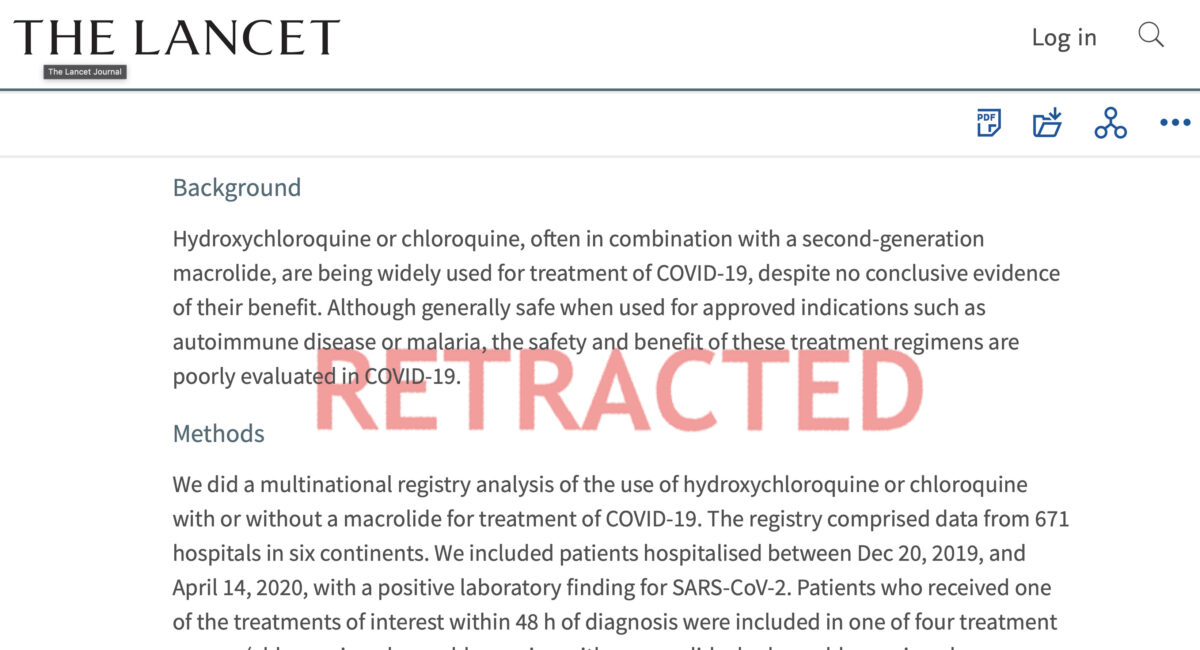Over 300 COVID-19 Papers Withdrawn for Not Meeting Standards of Scientific Soundness
Research journals have withdrawn well over 300 articles on COVID-19 due to compromised ethical standards and concerns about the publications’ scientific validity.
Retraction Watch has provided a running list of withdrawn papers on COVID-19 ranging from “Acute kidney injury associated with COVID-19” to “Can Your AI Differentiate Cats from COVID-19?”
A total of 330 research papers have currently been retracted.
During the pandemic, researchers have compromised on ethical standards and tried to either get more publications approved or to take shortcuts around ethics, senior researcher Gunnveig Grødeland at the Institute of Immunology at the University of Oslo says, after going through the list of articles that have been withdrawn, and the reasons for some of them.
While it is quite natural for some articles to be updated or changed to be published in a different form, some have been retracted because the researchers did not obtain informed consent during the research.
“It will, of course, be withdrawn when it is found that ethical guidelines have been breached,” Grødeland told Khrono, a Norwegian higher education and research newspaper.
She pointed out that other articles have been withdrawn after the editors noticed that the strategies the papers mentioned were giving the wrong impression in the media of being recommended as actual treatment or prevention of COVID-19.

However, most of the retracted papers were published in smaller journals, the vaccine researcher points out.
“When you look at the articles that have been retracted, the vast majority were published in the less interesting journals. It is they who are mainly affected by withdrawals,” Grødeland said.
But there were a number of environments that do not normally carry out research, which suddenly started producing research after receiving funding from local hospitals.
“It may have caused things to get a little out of hand in some places,” she said.
Hearing Loss?
A recent case from the University of Manchester backtracked on an earlier study that said that COVID-19 was associated with hearing loss, tinnitus (ringing in the ears), and vertigo.
Published in 2021, the researchers said they had identified about 60 studies that report audio-vestibular problems in people with confirmed COVID-19.
“Our analysis of the pooled data, published in the International Journal of Audiology, reveals that seven to 15 percent of adults diagnosed with COVID-19 report audio-vestibular symptoms,” audiology professor at the University of Manchester Kevin Munro said.
“The most common symptom is tinnitus followed by hearing difficulties and vertigo.”
Two years later, after the virus has been blamed for a range of health problems, including auditory disorders, the same university published a new study concluding that hearing loss is unlikely to be caused by COVID-19.
She said these sorts of articles had to be withdrawn as they claimed things that neither the authors of the articles nor their institutions could vouch for.
In addition, some studies did not include a large enough sample size.
When more subjects were included, the researchers could no longer maintain the same conclusions they made earlier about the effect of the drugs.
Some 90,000 to 300,000 COVID-19 papers have been lodged since the start of the pandemic, dwarfing that of other pandemics “by orders of magnitude”.
An investigation by Monash University reported that even after papers were retracted, they continued to be cited.
“Among the more than 270,000 COVID-19 papers that have been lodged online since the start of the pandemic, 212 retracted papers investigated were cited 2,697 times, a median of seven times per paper,” the university said in Oct. 2022.
“A Little Out of Hand”
Grødeland said that part of the reason this happened during the pandemic was that relatively more people suddenly started conducting research on a topic they really knew relatively little about.
Even prestigious journals such as the Lancet were publishing those articles.
One of Lancet’s studies even caused both the World Health Organization (WHO) and the national government to stop the comprehensive testing of hydroxychloroquine’s effectiveness against COVID-19.
The extensive Lancet study, allegedly based on research fraud, said that the drug increased the risk of heart arrhythmia and mortality for COVID-19 patients.
Lead author and audiologist Anisa Visram explained their reasoning.
“We know that viruses such as measles, mumps, and meningitis can damage the auditory system,” Visram said in a release.
“It is also well known that COVID-19 can affect our sense of smell and taste, so it was reasonable to assume it might also affect our sense of hearing.”
Visram assured that their current study is well designed and executed and is the most thorough assessment of hearing conducted in people with COVID-19.
Munro also acknowledged that their earlier work may have been rushed.
“There was an urgent need for this carefully conducted clinical and diagnostic study to investigate the long-term effects of COVID-19 on the auditory system,” he said.
“Many previous studies were published rapidly during the pandemic but lacked good scientific rigour.”
“It hasn’t been clear if these are incidental findings or if COVID-19 is damaging the hearing system,” Professor Richard Ramsden, Trustee at the Dowager Countess Eleanor Peel Trust, added.
“While the study cannot rule out infrequent hearing loss as a result of COVID-19, we now know that for most people, there is nothing to be concerned about.”
Reposted from: https://www.theepochtimes.com/over-300-covid-19-papers-withdrawn-for-not-meeting-standards-of-scientific-soundness_5293140.html





.png)


Comments
Post a Comment